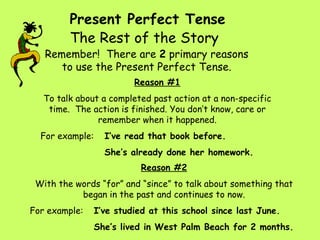
Present Perfect Tense
- 1. Present Perfect Tense Remember! There are 2 primary reasons to use the Present Perfect Tense. The Rest of the Story Reason #1 To talk about a completed past action at a non-specific time. The action is finished. You don’t know, care or remember when it happened. For example: I’ve read that book before. She’s already done her homework. Reason #2 With the words “for” and “since” to talk about something that began in the past and continues to now. For example: I’ve studied at this school since last June. She’s lived in West Palm Beach for 2 months.
- 2. When we use the Present Perfect with “for” or “since” it gives the idea that something began in the past and continues into the present (and may continue into the future.) SINCE + POINT IN TIME Use the present perfect with “since” + point in time (since 5:00 , since Monday , since 1994 ) to show when something started. I’ve worked at this job since last year . He’s lived in Florida since March . They’ve been married since 1985 .
- 3. FOR + LENGTH OF TIME Use the Present perfect with “for” + length of time (for ten minutes , for two weeks , for years , for a long time ) to show how long a present condition has lasted. I’ve worked at this job for one year . He’s lived in Florida for 9 months . They’ve been married for a long time .
- 4. SINCE can also introduce a time clause. OK…..So what’s a time clause? Take a look at the following examples: I’ve lived in Lake Worth since I moved to Florida. When the action in the time clause ended in the past , use the simple past tense in the time clause. (“ moved to Florida ” is over…it happened…it is finished.) I’ve studied at the AEC since I’ve lived in Florida. When the action in the time clause began in the past but continues into the present , use the present perfect. (I still live in Florida.)
- 5. So…… How do we ask questions using this tense? When we want to know the length of time something has taken place we use the question words “HOW LONG.” How long have you lived in West Palm Beach? I’ve lived here for 2 years. How long has she studied English at the AEC? She’s studied at the AEC since 2005.
- 6. Wake up! Back to Reason #1 (completed past action at a non-specific time) We often use the Present Perfect with already to talk about things that have happened before now. I’ve already eaten breakfast. She’s already read that book. You’re too late. He’s already left for school. He’s left for school already. Already usually comes between have and the past participle. However, it can also come at the end of the clause. Take a look above.
- 7. Use the present perfect with not yet to talk about things that have not happened before now . We’re hungry. We haven’t eaten lunch yet. Sure I’ll go with you. I haven’t seen that movie yet. We’ve waited for an hour, but they haven’t arrived yet. They haven’t yet arrived. (This is OK.) Notice that yet usually comes at the end of the clause. However, it can also come between the ‘have not’ and the past participle.
- 8. We usually use yet in questions to find out if something has happened before now. Have you bought your mother a present yet? Has she seen that movie yet? Have they left for school yet? Sometimes we use already in a question to express surprise that something happened sooner than expected. Have you already bought your mother a present? I didn’t know you had a chance to go shopping. Have they already left for school? It’s so early.
- 9. Any Questions? No? OK Let’s Practice!